The Google Pixel C Review
by Brandon Chester & Joshua Ho on January 25, 2016 8:00 AM ESTSystem Performance
One of the highlights of the Pixel C is the fact that it is powered by NVIDIA's Tegra X1 SoC. This technically isn't the first time that X1 has shown up in an Android device since it powers the SHIELD Android TV, but it's the first time it has been used in a mobile device. This implementation of Tegra X1 has four Cortex A57 cores with a peak frequency of 1.91GHz, along with four Cortex A53 cores. There are a few things that need to be mentioned about how Tegra X1 differs from other SoCs with eight cores. The first is the fact that in theory, Tegra X1 uses cluster migration rather than Heterogeneous Multi-processing. The reason I said in theory is because the implementation in the Pixel C is really only using the A57 cluster and scaling the frequency as low as 51MHz and as high as 1.91GHz.
In any case, all of our benchmarks should trigger the A57 cores in a mobile device that pairs A53 and A57 cores, so the discussion of the A53 cores being disabled is more relevant from a power consumption standpoint than a performance one. To analyze the general performance of the Pixel C I've run it through our standard JavaScript tests, along with PCMark and BaseMark OS II.
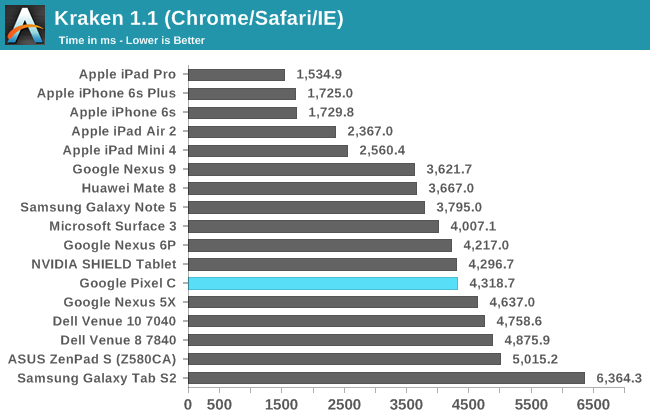
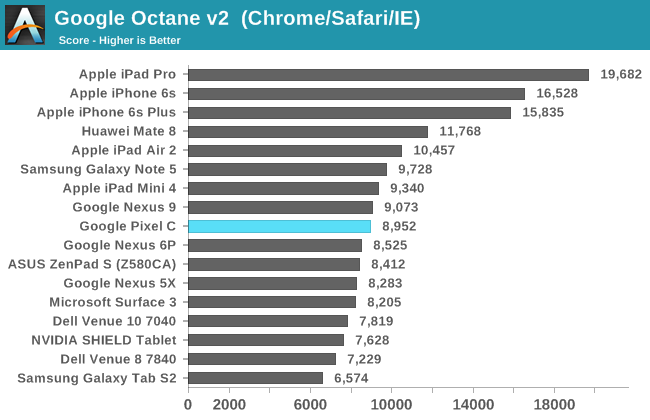
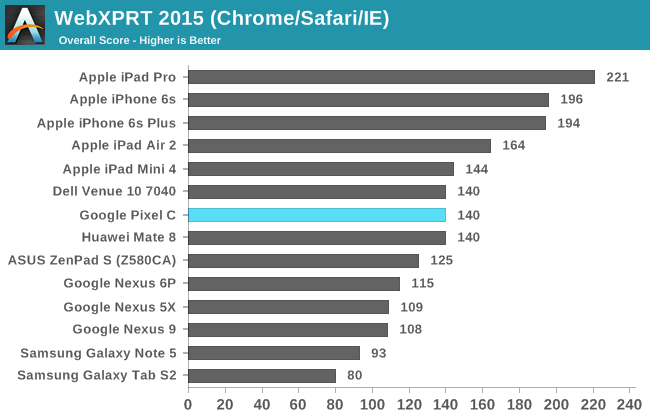
Unfortunately, the Pixel C doesn't make a very strong showing in our JavaScript benchmarks. I can't help but feel that this is the result of a rushed Android build, as there are regressions compared to the Nexus 9 in Octane and Kraken, and in all cases the score just isn't that impressive. JavaScript performance is definitely something Google will have to work on in the future, as the gap between the performance of iOS and Android devices is growing fairly large.
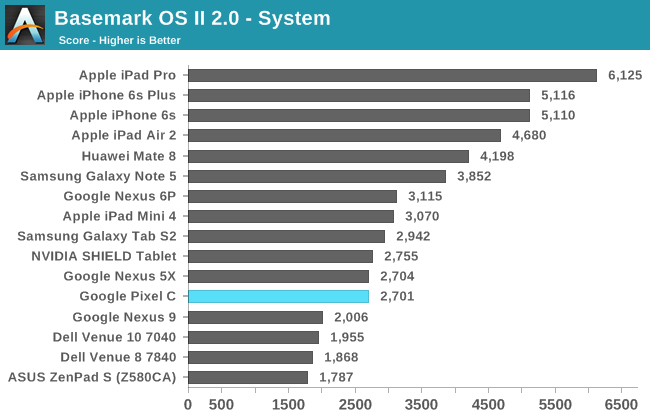
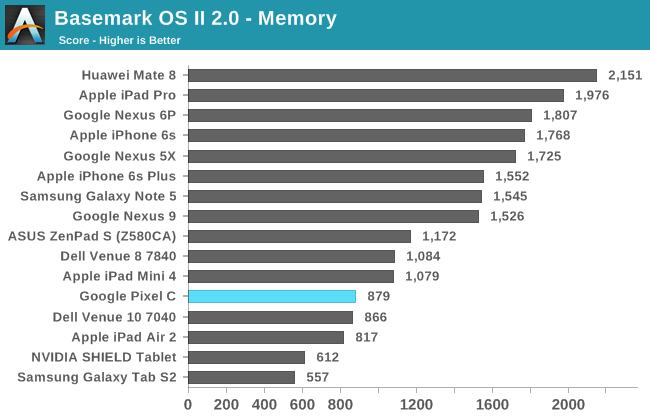
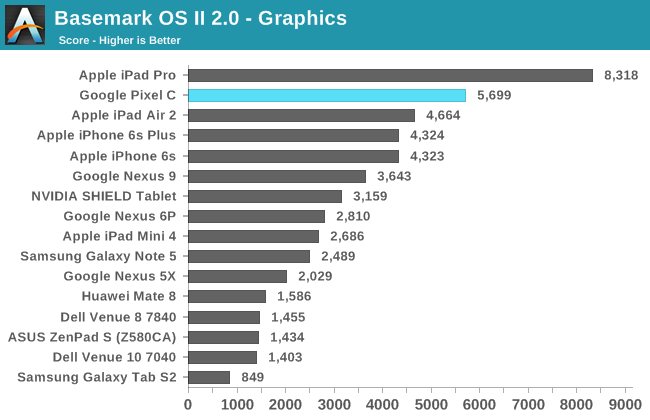
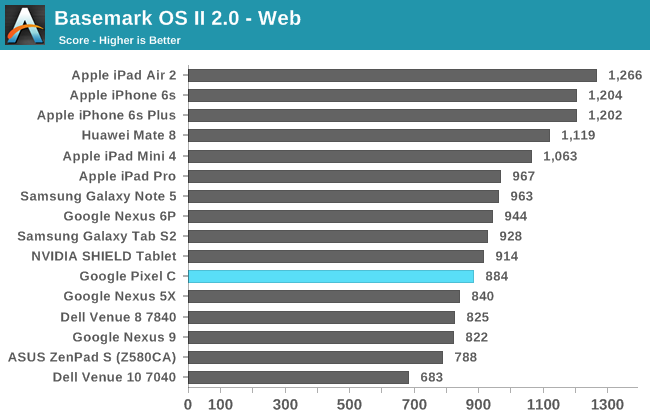
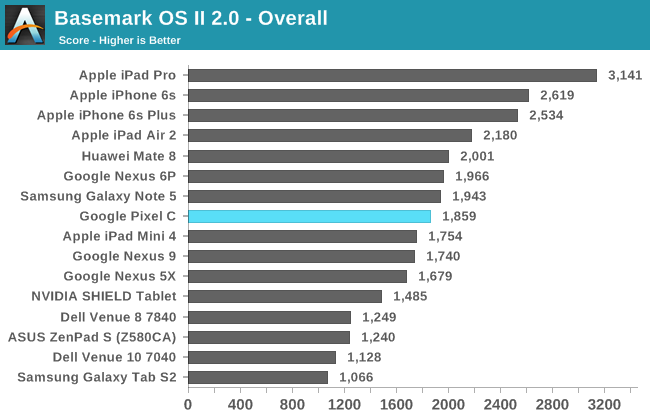
The Pixel C only achieves decent results in BaseMark OS II. The NAND memory score definitely drags down the overall rating, with the web score being lower than expected, and the system score being shocking low. The stand out score is in the graphics test, with the Pixel C only coming second to Apple's iPad Pro, and beating out the next best Android device, which is also NVIDIA-powered, by a huge margin. Unfortunately, high as it may be, Tegra X1's graphics performance just isn't enough to carry the Pixel C here.
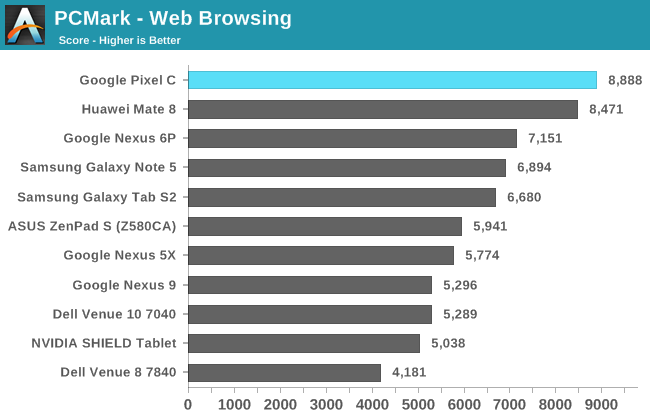
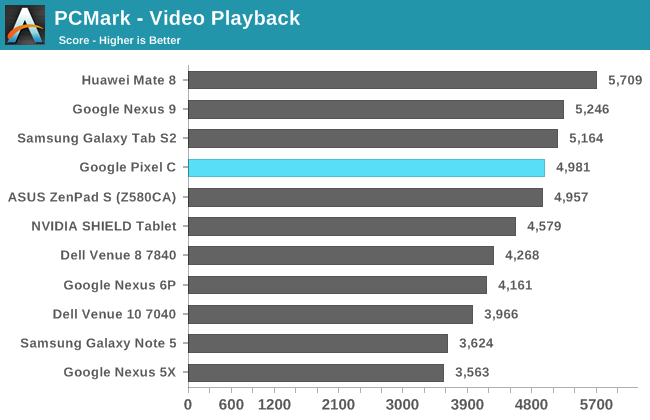
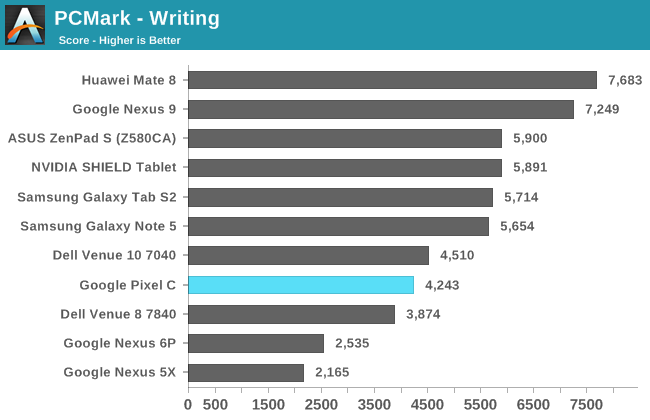
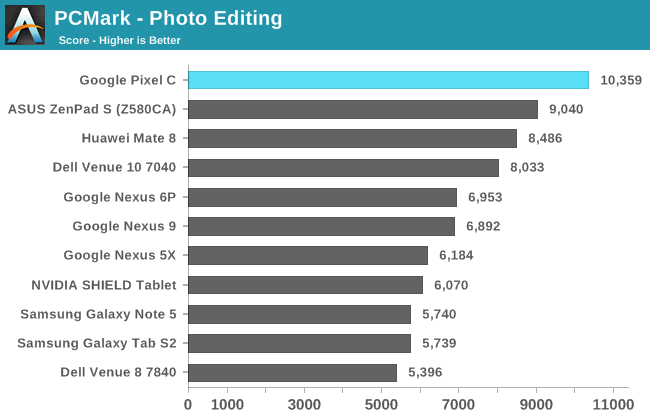
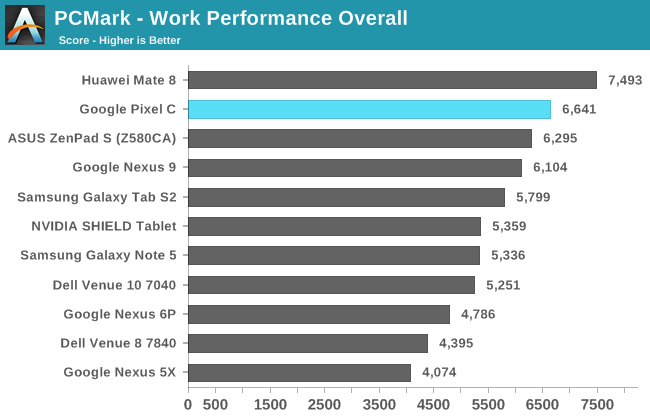
PCMark paints a different picture than BaseMark OS II, and highlights how performance can be highly variable based on workload, software, and whether an app is run as a native binary or through ART. In PCMark the Pixel C performs exceptionally well, with the exception of the writing test which seems to have been impacted by some change made to ART on Google's devices when moving to Marshmallow. Putting that aside, we see quite high and often chart topping scores in the remaining tests, resulting in a final score that only sits below the Huawei Mate 8.
Characterizing the Pixel C's performance is difficult. PCMark paints a very good picture, and I'm tempted to lean toward it as it is representative of the tasks that users will perform on a daily basis. There's a bit more discussion to be had about the Pixel C's general performance, and that'll come a bit later in the software section of the review. What I can say is that Tegra X1 certainly is fast as far as raw speed goes, but there's more to be said about the Pixel C's performance when you consider the role of both hardware and software.










122 Comments
View All Comments
kurkosdr - Monday, January 25, 2016 - link
Split-screen is a problem devs aren't at fault, but Google.jbelkin - Monday, January 25, 2016 - link
Because android only sells when it's subsidized or discounted heavily. That is why android tablets sell fine at $99 but not beyond that. The facts are that android is only fit for low end products - look at Nest now, stops working periodically - an annoyance for a phone or a tablet but deadly when in cold climates when you need the temperature maintained ... but what does Google care* - as long as the tracking info arrives back, the rest - who cares? What, you want your "free" money back?* one reason why google is changing its name tio alphabet, non assiciation with google branding.
Speedfriend - Tuesday, January 26, 2016 - link
Android only fit for low end products? I use iOS and Android products on a daily basis and my Android phone is far more stable than my iPhone, many of my Android apps work better too. And don't get me start on iPhone reliability. The number of hours I have wasted in my life trying to get an iPhone repaired because the touchscreen or fingerprint reader has broken again. We use iPhone as our work phone and the reliability is awful compared to our laptops and PCs.vanilla_gorilla - Tuesday, January 26, 2016 - link
I've got right at 480 iOS devices registered in Air-Watch so my anecdote > your anecdote, and we don't have any of the problems you're describing. The only time an iPhone breaks is when someone drops it or the rash of iPhone 5 we had years ago with the battery issue (for which Apple had a replacement program).fastfreddy68 - Wednesday, March 29, 2017 - link
jbelkin I read your stupidity and cant hold back . Tablets dont sell much because the "niche" they had is gone. Phablets replaced it. Apple six plus is a direct result of the popularity of Samsungs NOTE 4 and f,,,, Android. The Google pixel isnt sold to the poor Rube it cost more then some Iphones.Obviously you are some FANBOY. I'll put my LG V20 up against your Iphone any day.People like Android because of the creativity it allows.
NFC and Waterproofing a direct result of Androids popularity. Claiming Android is only for the poor is so 5 years ago. Maybe instead of buying another Apple product you should buy a clue.!
extide - Monday, January 25, 2016 - link
While I agree the Asian desire for CORESSSSSSS is a bit off, I don't think it really has anything to do with it. Ultimately most people don't care what processor is in the tablet. They care is it slow/crappy? If not, its ok.The software ecosystem, on the other hand, is the big deal. Android is well known for not having many good tablet focused apps. That is a much bigger issue than the cpu and stuff. I mean obviously this thing has great build quality, that's not holding it back.
easp - Monday, January 25, 2016 - link
The lack of good Android tablet software is a problem, but the fact that the Android tablet and phone market is dominated by SoCs with too many cores and too little single-thread performance is a big problem.I don't think its fair to place blame solely at the feet of asian customers. Plenty of spec-obsessed western customers have taken the bait too.
The poor single core performance means that javascript web apps are slow, because Javascript engines are single threaded.
jbelkin - Monday, January 25, 2016 - link
it does matter. high spec high cost android tablets do not sell - just like $1,500 chromebooks or WIN PC's. The max price for an android tablet is $99 and $299 for a chromebook.johnnyzleong - Monday, January 25, 2016 - link
Wow,"The Google ecosystem is focused on ignorant third-world consumers that think more cores are somehow better than faster individual cores."
Holding a iPad makes you feel so good isn't it?
McDuncun - Tuesday, January 26, 2016 - link
That`s the problem man, the Apple Market is so heavily condensed... Not with rational people or a well rounded product line but with the smug bastardized self righteous fumes that all Apple owners exude from their well bleached orifices. Stigmas are there for a reason and yes I can be petty and still make a good argument.